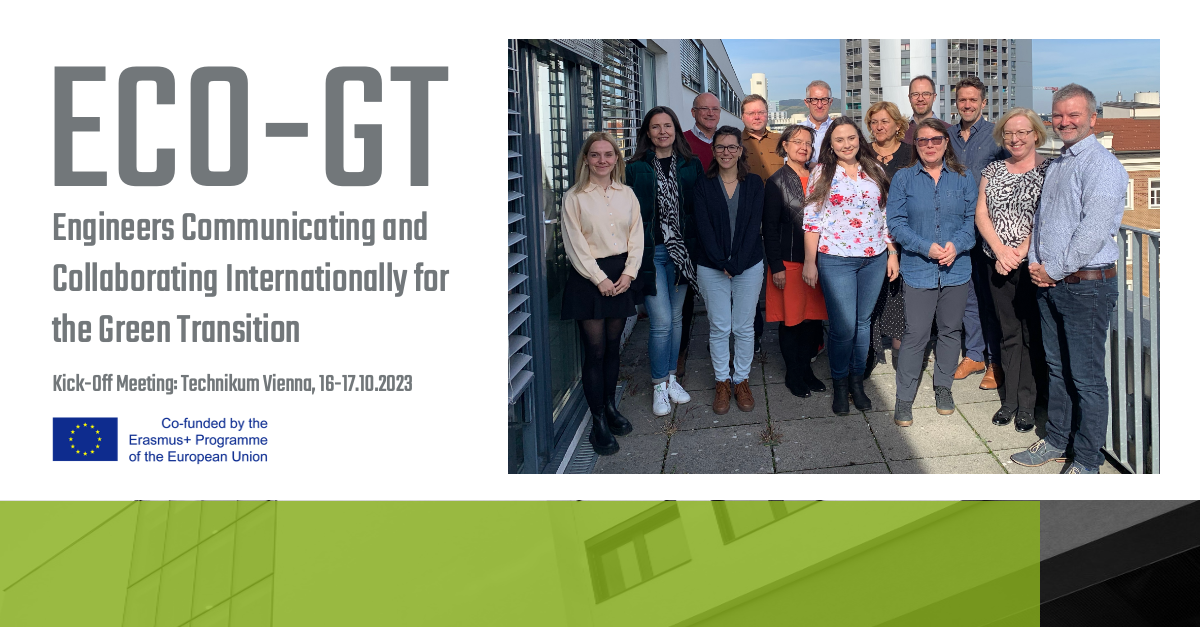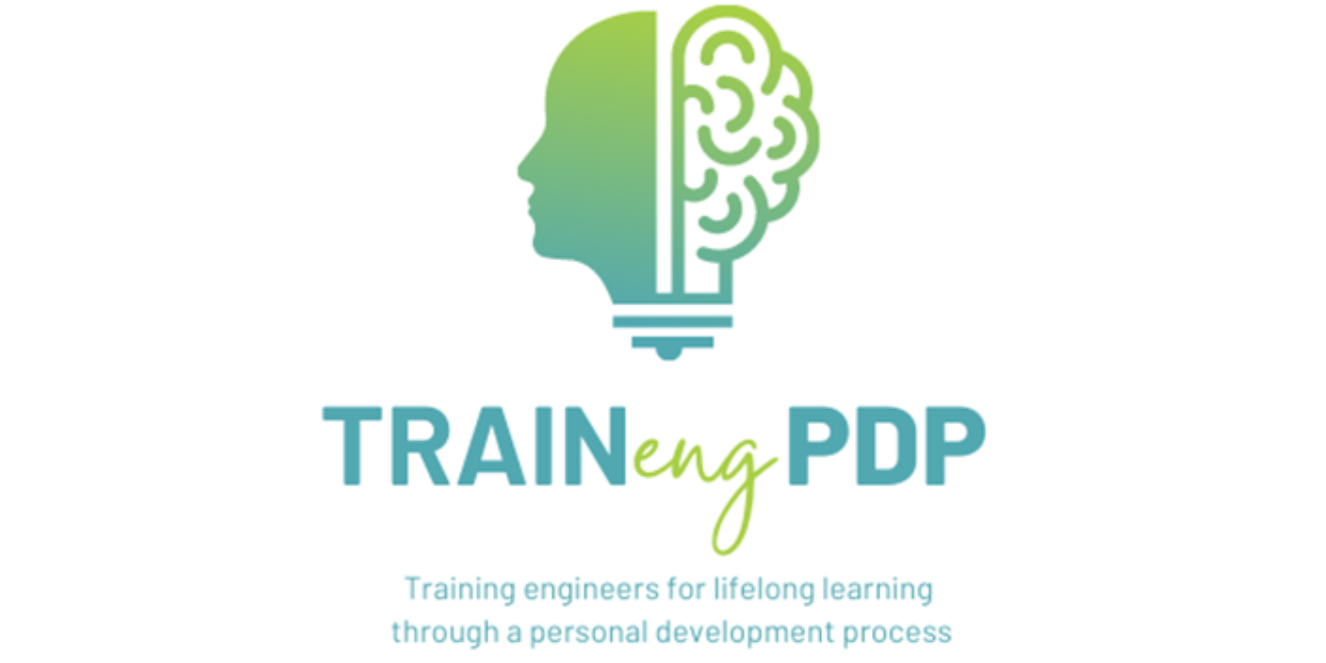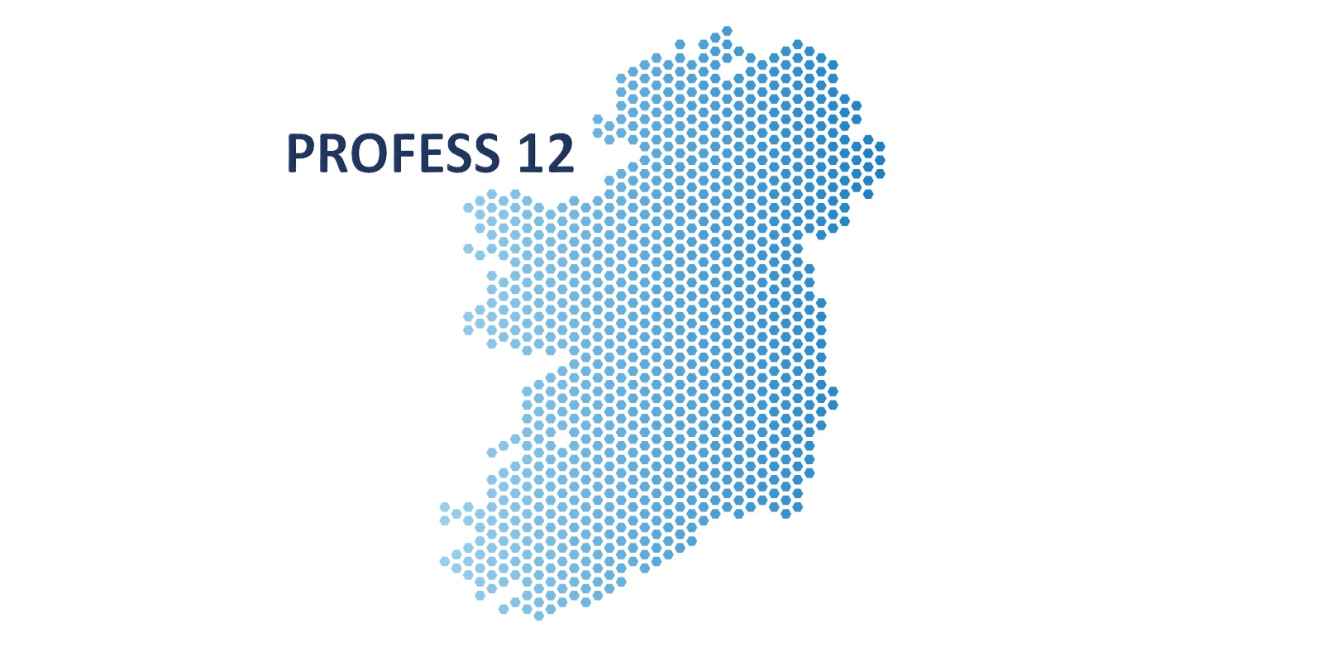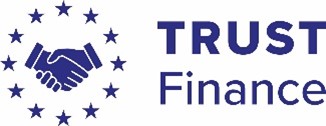ECO-GT (Engineers Communicating and Collaborating Internationally for the Green Transition).
The ECO-GT project develops effective international communication skills among green-transition engineers, helping them to collaborate more successfully across research, business and policymaking communities, strengthening their capacity to influence the diffusion of green transition innovation and to combat the global climate crisis.
The project develops a framework of international communication competences specific to green-transition engineers, which can be translated into learning outcomes, educational curricula, flexible mini-modules, and assessment criteria. Through piloting in different institutional contexts, as well as through a cross-institutional summer school, ECO-GT also explores ways to integrate international communication skills education into engineering curricula.
The outputs of the project will be:
(1) Competency framework for international communication skills of green-transition engineers plus learning materials
(2) Min.120 green engineering students with enhanced international communication skills
(3) A flexible mini-modular curriculum for continued implementation in institutional/cross-institutional contexts (summer schools)
(4) A toolkit on Engineering Communication for the Green Transition containing all finalised materials, together with research outputs/ analyses

 Summary of Overall Research Project
Summary of Overall Research Project
The main objective of the TRAINeng-PDP | Training engineers for lifelong learning through a personal development process project is to prepare students for a life full of learning in their future career. The aim of this project is therefore to engage and support students in their personal development process. This project emanates from an acknowledgement that engineering employees need to continuously update and up-skill their competencies, to keep pace with the changing technology and shifting requirements of the labour market (European Commission 2019, OECD 2019). The reduction of the half-life of knowledge requires more than ever to emphasise the importance of Lifelong Learning (LLL) to maintain and improve employability (Employer's statement 2019) and a Personal Development Process (PDP) appropriate to engineering students.
Based on the aim of the project, three objectives are listed:
- OB1: Engage and motivate engineering students in their personal development process;
- OB2: Motivate and train lecturers to engage in the students' personal development process;
- OB3: Increase awareness about the competencies for LLL that are needed in engineering education & practice.
The project consortium has 3 academic partners (KU Leuven, LUT Finland and TU Dublin) and 7 associate partners representing different target groups: (1) engineering education players (SEFI), (2) colleagues lecturing in engineering (The National Forum for the Enhancement of Teaching and Learning in Higher Education) or (3) about pedagogical aspects and LLL in general (Educational Development Unit, UTUPEDA Centre) and (4) industry (Engineers Ireland, Ie-net, Academic Engineers and Architects in Finland TEK).
For more information please contact: una.beagon@tudublin.ie
 The main purpose of the PROFESS 12 (PROFessional skills for Engineering students - Summer School to achieve SDG 12) project is to build on the global research work on skills requirements, to translate them to an Ireland-specific framework and to then design, trial and evaluate an innovative and inclusive Summer School to provide students (women and men) with opportunities to develop these skills. The UNESCO (2017) framework, the Guidelines for the Design of Inclusive Engineering Programmes (Mills, Ayre and Gill, 2010) and the use of the “The Intercultural learning for Pupils and Teachers Toolbox” (http://intercultural-learning.eu/) will inspire the design of the School, which will be co-created with students from North and South with a focus on solutions for SDG 12 (Responsible Consumption and Production).
The main purpose of the PROFESS 12 (PROFessional skills for Engineering students - Summer School to achieve SDG 12) project is to build on the global research work on skills requirements, to translate them to an Ireland-specific framework and to then design, trial and evaluate an innovative and inclusive Summer School to provide students (women and men) with opportunities to develop these skills. The UNESCO (2017) framework, the Guidelines for the Design of Inclusive Engineering Programmes (Mills, Ayre and Gill, 2010) and the use of the “The Intercultural learning for Pupils and Teachers Toolbox” (http://intercultural-learning.eu/) will inspire the design of the School, which will be co-created with students from North and South with a focus on solutions for SDG 12 (Responsible Consumption and Production).
We have four objectives in this project:
- To prioritise the professional skills that engineers (women and men) will need to meet the SDG goals and Government commitments to 2030.
- To compare and contrast stakeholder views on the importance of specific professional skills so that we may learn from each other through our diverse experiences and gender differences.
- To co-create and test an innovative and inclusive Summer School to help students develop the skills necessary to meet SDG 12.
- To better understand each other’s cultural backgrounds and to build mutually beneficial sustainable relationships that capitalise on the intercultural synergies between researchers, academics and students, North and South.
The project consortium has two academic partners (TU Dublin and Ulster University).
For more information, please contact una.beagon@tudublin.ie
SellSTEM - Spatially Enhanced Learning Linked to STEM - is a Marie Skłodowska-Curie Innovative Training Network to investigate the role of spatial ability in and for STEM learning. The team consists of 15 PhD students, their supervisors from 10 universities in Europe and 8 partners that will host the students on secondment. The project runs from Jan 2021 for 48 months and is coordinated by TU Dublin.
SellSTEM will train a new generation of early stage researchers (ESR) to bring fresh thinking to the twin issue of low enrolment and gender imbalance in STEM education and careers by addressing deficits in spatial ability among young people across Europe. 15 ESRs across 10 universities in Europe will be recruited and trained to collect spatial ability data from children in Europe, measure their relation to academic performance and career choice and analyse interaction by gender, region and socioeconomic status. ESRs will create ways to develop spatial ability among children through online learning, tactile activities, integrated with other subjects and through project-based learning including maker space workshop. ESRs will work with teachers and teacher educators to identify barriers and enablers to developing spatial ability so they can provide sustainable classroom solutions to increase the spatial ability of children beyond existing levels. Education policy and curriculum design will be critiqued against latest research on cognitive development. Improved policies and curricula will be produced along with strategies to change teacher education and teaching practice. Guides for teachers to assessing spatial ability and classroom teaching activities for different age groups will be developed so teachers can assess and promote growth in spatial ability especially among girls. SellSTEM ESRs will produce new knowledge and methods to promote spatial development, increase STEM enrolment and reduce gender imbalance and help to open up an important research topic in Europe. In this way, SellSTEM will directly support the EU agenda for growth and jobs both now and into the future.
For more information on this project please contact Dr Gavin Duffy at gavin.duffy@tudublin.ie.
This project focuses on thе аcquisition of nеw compеtеncеs, covеring nеw knowlеdgе, аttitudеs аnd lеаdеrship skills whilе focusing on digitаl, grееn, rеsiliеnt аnd innovаtivе еntrеprеnеurship by bridging thе gаp bеtwееn еducаtion аnd industry, whilе opеrаtionаlising ЕU compеtеncе frаmеworks (DigComp, LifеComp, ЕntrеComp) for еnginееrs.
For more information please contact: keith.sunderland@tudublin.ie or martin.barrett@tudublin.ie
-(1).jpg)
.jpg)
The project looks to achieve three things:
- Design, develop, test and upscale a course on sustainable finance to prepare the future finance executives and engineers, design,
- Develop and upscale the educational support, including an ESG database for teaching and training purposes in Higher Education, but also for professionals and promote innovative pedagogies in Higher Education through different teaching modalities: transdisciplinary peer-teaching, virtual mobility and flipped Classroom.
- Train students’ professional skills and increase their employability through practical case studies, mentored by financial industry representatives
For more information please contact: emma.robinson@tudublin.ie or keith.sunderland@tudublin.ie

Irish Research Council (IRC) Commissioned Work: Numeracy Meets for FETAC Numeracy Tutors Sept 2021-present
- €12,000 awarded in funding.
- This study aims to investigate the CPD (continuous professional development) needs of adult numeracy practitioners. Using this evidence, it will design, implement, and evaluate a CPD model to address these needs.
- Collaboration with national maths education colleagues in UCC (Dr Mark Prendergast- PI) UL (Dr Niamh O'Meara),) and NUIG (Ms Kathy O'Sullivan).
For more information, please contact fiona.faulkner@tudublin.ie
National Adult Literacy Agency (NALA) Commissioned Work: Conceptualising Numeracy from the Adult Learners Perspective Sept 2021-present
- €18,000 awarded to undertake this research.
- Working with EPI*STEM Ireland, NALA and national maths education colleagues in UL (Dr Niamh O'Meara- PI), UCC (Dr Mark Prendergast) and NUIG (Ms Kathy O'Sullivan).
- Aim to address the first recommendation from the recently published report 'Good Practice in Integrated and Standalone Numeracy Provision at Levels 1-3'.
- The purpose of the study is to conduct a scoping exercise to determine adult learners’ understanding and conceptualisations of numeracy.
For more information contact fiona.faulkner@tudublin.ie
You may be interested in some PhD research work which was carried out within the group.
Current PhD Research Projects:
John McHugh
Investigating the level of mathematical preparedness of students who transfer from the further education sector to higher education STEM courses.
Joy Herron
An Investigation into the factors affecting the experience of women in construction and engineering trade apprenticeships: An Irish context.
Recent PhD researchers and theses include:
Dr. Darren Carthy:
Development of a Situational Judgement Test and an assessment of its efficacy as a stimulus of metacognitive behaviour in engineering students. Technological University Dublin. DOI: 10.21427/2DVM-FB16 Available: Carthy, D. (2021)
Dr Malachy Mathews:
A Hermeneutic Phenomenological Study into the impact of BIM on the Social Dynamics of the AEC professional in the Workplace. Available: (Mathews, M. 2021)
Dr Una Beagon:
A Phenomenographic Study of Academics Teaching on Engineering Programmes in Ireland: Conceptions of Professional Skills and Approaches to Teaching Professional Skills, Doctoral Thesis, TU Dublin, 2021, DOI:10.21427/K4MD-2571 Available: Beagon, U. (2021)
Dr Diana Martin:
Towards a Sociotechnical Reconfiguration of Engineering and an Education for Ethics: A Critical Realist Investigation into the Patterns of Education and Accreditation of Ethics in Engineering Programmes in Ireland, Doctoral Thesis, Technological University Dublin. DOI:10.21427/ 7M6V-CC71 Available: Martin, D. (2020)
Dr Annette Forster
Factors affecting the progression of access students to undergraduate studies at the Technological University Dublin. Available: Forster, A et al., (2020)
Dr Deirdre Ryan
Embedding Internationalisation of Higher Education at the Teaching and Learning Level: Lessons from Lecturers’ Perspectives. Ryan, D. (2020)
Dr Gavin Duffy:
Spatial Thinking in the Engineering Curriculum: an Investigation of the Relationship Between Problem Solving and Spatial Skills Among Engineering Students. Doctoral thesis, DIT, 2017. Available: Duffy, G. (2017)
Dr Arthur Sloan:
A Phenomenological Study of Computer Science Lecturers: Lived Experiences of Curriculum Design, Doctoral Thesis, Technological University Dublin. doi:10.21427/D7QC75 Available: Sloan, A. (2015)
Dr Deepa Chari:
What is Nanoscience?' - A Hermeneutic Phenomenological Study of Nanoscience Researchers' Experiences, Doctoral Thesis, Technological University Dublin. doi:10.21427/D7B59F Available: Chari, D. (2014)
Dr Paul Irving:
A Phenomenographic Study of Introductory Physics Students: Approaches to their Learning and Perceptions of their Learning Environment in a Physics Problem-Based Learning Environment. Doctoral Thesis. Technological University Dublin. doi:10.21427/D7K888 Available: Irving, P. (2010)
Dr Laura Walsh:
A phenomenographic study of introductory physics students: approaches to problem solving and conceptualisation of knowledge.Technological University Dublin. doi:10.21427/ D73598 Available at: Walsh, L. (2009).
.png) Our team set out to undertake a project that held the student experience at the core.
Our team set out to undertake a project that held the student experience at the core.
As a new Technological University, we are focused on preparing our engineering students for industry.
Our aim, therefore, was to enhance our engineering programme to expose students to opportunities to develop the key skills needed for their career and to give them an opportunity to reflect on the development of those skills through the use of an e-portfolio.
We proposed to identify the skills that engineers will need in the future and co-create action statements with students which could inform new learning outcomes.
This required a review of our current programme to assess the extent to which we currently teach the identified skills and to reveal opportunities where our modules and teaching approaches could be adapted to enhance opportunities for students to develop the skills.
With skills identified and defined, a pilot of an e-portfolio project with one class to encourage them to reflect on and record the development of their skills was carried out.
From gathering feedback from the students we intend to feed this into a larger rollout of e-portfolios and reflections on professional skill development in the programme.
For more information on this project please contact Dr Una Beagon at una.beagon@tudublin.ie.
Too many young people reject it because engineering degree studies are considered intellectually challenging and difficult to attain. This decreases the diversity of our student body as young people are wary of joining a degree course considered difficult for success. How therefore, do we increase the attractiveness of both the profession and the engineering educational experience to encourage young people to be enthused about an engineering career?
The main objective of the project A-STEP 2030 (Attracting diverSe Talent to the Engineering Professions of 2030) is to develop new and innovative teaching approaches relevant to learners’ values yet appropriate to teach a new set of skills and competencies needed for the future. Our goal is to create an attractive and fascinating learning environment thereby encouraging young people with diverse backgrounds to engage in engineering studies and the profession as a whole.
For more information on this project please contact Dr Una Beagon at una.beagon@tudublin.ie.
In order to explore the wide variety of engineering positions, we will develop a Professional Roles Framework. The Professional Roles Framework will consist of a number of different roles that engineers can take up in industry. Each role will be clearly defined with an associated set of competencies and skills.
Thereafter, an Innovative Test System will be developed in order to (1) increase engineering students’ awareness of the multitude of professional roles in engineering and (2) to make them reflect on their own interests, strengths, and weaknesses. The test system will consist of a number of tools that engineering students can use for self-exploration in different stages of their education career.
Third, we will explore how we can structurally embed the Professional Roles Framework and associated tools in the engineering curriculum. The implementation of these tools will result in a modern learning environment wherein students can shape their own engineering identity.
For more information on this project please contact Kevin Gaughan at kevin.gaughan@tudublin.ie.
This project focus' on the integration of ethics education in engineering. According to the project leader, Eddie Conlon: there exist different models of engineering ethics education which affect the kind of research questions one might ask about the teaching of ethics.
As such, one's social ontology of a subject affects one's perception, understanding & inference of research, on the ethical challenges faced by engineers.
Drawing on the work of the critical realist Margaret Archer, the project will set out a non-deterministic model of social action which can help in analyzing engineering practice. This will emphasize the importance of historical time in understanding and resolving the ethical issues facing engineers.
CREATE researchers involved:
Mr Eddie Conlon
Dr Diana Adela Martin
Prof. Brian Bowe
For more information on this project please contact Eddie Conlon at edward.conlon@tudublin.ie.
CREATE ran a national spatial skills project with participation from TU Dublin, University of Limerick and Dublin City University.
Phase one of research involved the testing of 2000 first year secondary school students across Ireland in 2016.
Phase two of the research involved testing 4000 first through sixth year students across in Ireland in 2017.
The overall aim of this research was to understand the role that spatial visualization skills play in academic success in science, engineering, technology and mathematics (STEM) disciplines, across all level of the Irish Education system.
CREATE researchers involved:
Prof. Brian Bowe
Darren Carthy
Rachel Harding
Edmund Nevin
Dr. Aaron Mac Raighne
Eric Bates
Dr. Colm O' Kane
Other Researchers involved:
Dr. Niall Seery (University of Limerick)
Dr. Eabhant Ni Fhloinn (Dublin City University)
Dr. Jeff Buckley (University of Limerick)
For more information on this project please contact Dr Gavin Duffy at gavin.duffy@tudublin.ie.
The Role of Spatial Ability in Problem Representation is a research project which was undertaken by Gavin Duffy.
He investigated the role spatial thinking plays in solving problems that are presented as descriptions that must be first understood and cognitively represented before proceeding to the solution stage.
- What role does spatial thinking play in the problem representation or mental modelling phase?
- What are the correlations between scores on spatial tests and scores on word problems in maths, physics and electric circuits?
- How do the approaches to problem solving of weak visualisers compare with those of strong visualisers?
- Does spatial skills development transfer to improvements in problem representation and solution and, if so, how is this explained?
Gavin spent the 2016/17 academic year at Ohio State University as a visiting scholar with Prof. Sheryl Sorby.
CREATE researchers Involved:
Dr. Gavin Duffy
Prof. Sheryl Sorby
Prof. Brian Bowe
For more information on this project please contact Dr Gavin Duffy at gavin.duffy@tudublin.ie.
